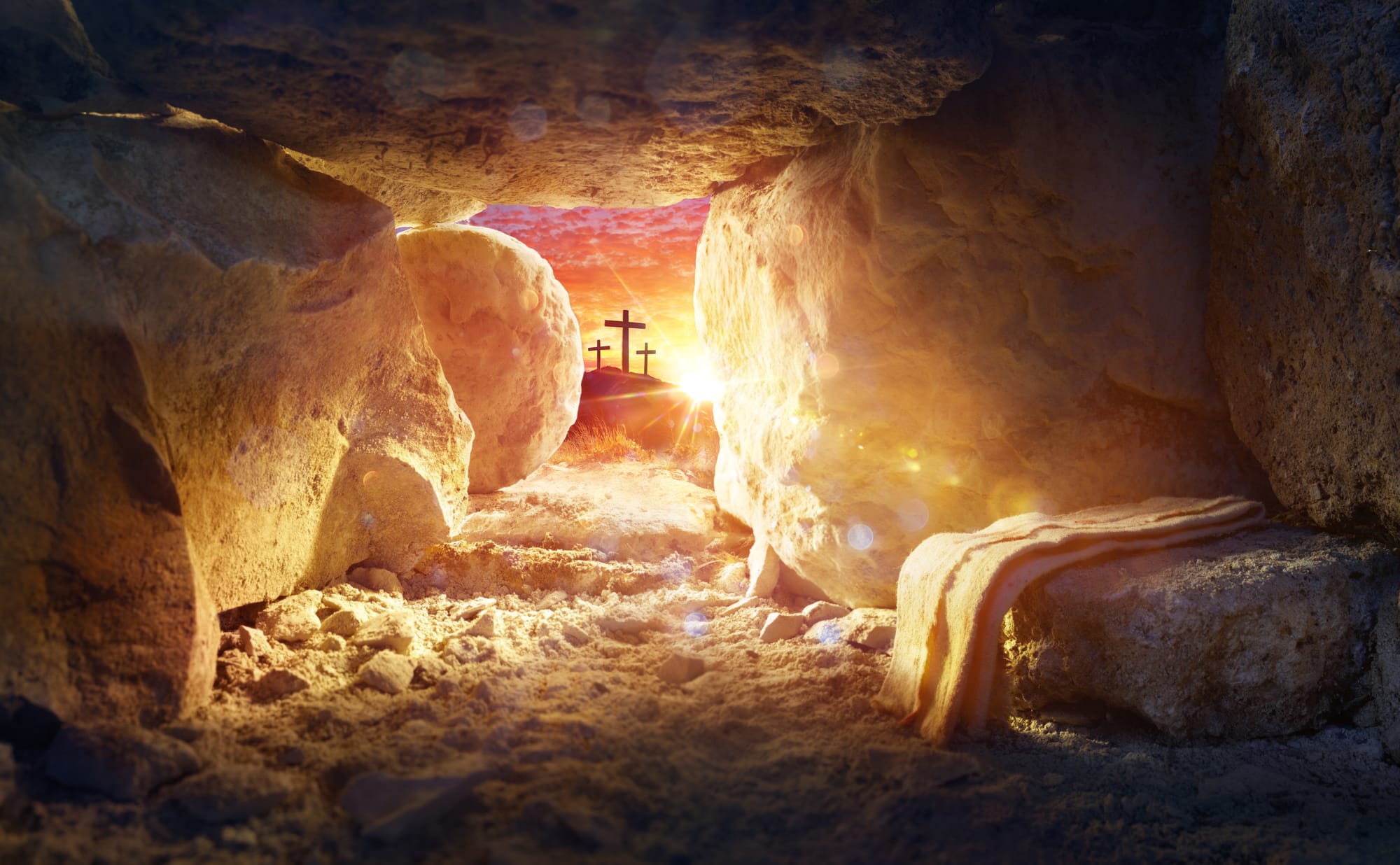“World missions have become messier, no thanks to Christian holiday trips”: OM founder George Verwer
by Geraldine Tan // November 28, 2019, 5:56 pm
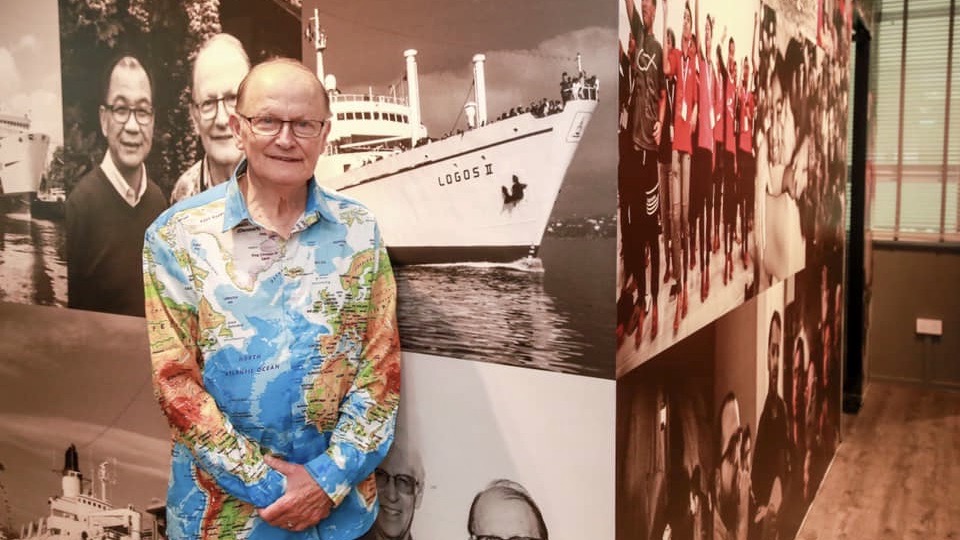
World missions are getting bigger, messier and more complex, notes Geroge Verwer, founder of Operation Mobilisation. Photo from Lawrence Tong's Facebook page.
For someone who pioneered short-term mission trips, George Verwer certainly doesn’t think much of what they have become.
“World missions have become so much bigger. It is also messier and more complex today because we not only have short-term missions, but we also have Christian holiday trips,” said the founder of missionary organisation Operation Mobilisation (OM), his face serious – a stark contrast to the colourful world map-print shirt he donned for the interview with Salt&Light at the OM International Director’s office.
“I don’t think it’s right, sending these people on short-term missions with no training, no prayer life. They don’t share faith where they live now. It’s just a Christian holiday that’s expensive,” he explained. “I’m not saying God doesn’t use it, but we aim higher.”
Closer than you think
At 81, Verwer has been involved in missions for 62 years, or three quarters of his life. He stepped down from OM leadership in 2003 but he and his wife, Drena, continue to be involved with the organisation’s Special Projects Ministry.
“My passion is that everybody in the world get the Gospel.”
“My passion is still part of my original passion – that everybody in the world get the Gospel, whether they’re an unreached people group, or they’re one of the millions living in the cities who are from those groups.
“But the people who are talking about reaching unreached people way out there are not willing to talk to a migrant who lives across the street,” he said with a sigh.
OM began in 1957 when Verwer was still a student at the Moody Bible Institute. He and two classmates, Dale Rhoton and Walter Borchard, drove into Mexico to distribute the Gospel of John after being inspired at a prayer meeting. Verwer was also actively sharing the Good News with people he met as well as organising prayer meetings.
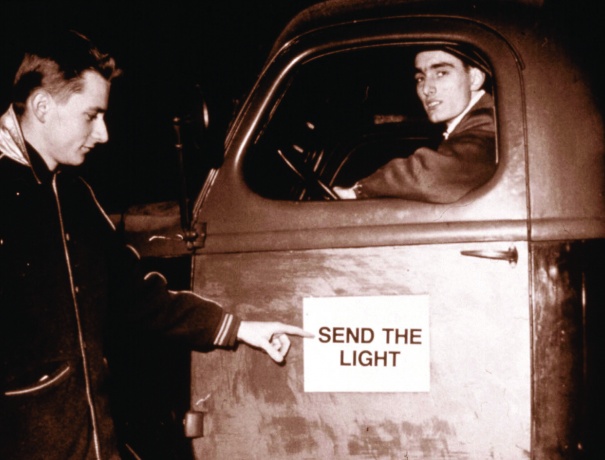
George (right) and his classmate, Walter Borchard, during the early days of OM. Photo from OM.org.
“OM started very small and I didn’t have any big dream plan.
“Now, I have people come to me with these big dream plans and when I ask if they are doing local outreach, they often reply ‘No’. They’ve got the dream but we need to get into the action,” urged the seasoned missionary and evangelist.
There is no better way to get your feet wet than starting local. It could also offer potential missionaries a glimpse into the culture of the country that they want to head to. And Singapore, with its multi-cultural and cosmopolitan society, is well placed for that.
“The real founder”
On the day of the interview, Verwer had popped by to Bintan for a few hours to check out the MV Doulos, which has been converted into a hotel. Before it was decommissioned in 2009, the ship served as a floating bookshop, bringing knowledge, help and hope around the world and impacting millions of lives.
“The real founder of OM’s work in all these countries is the ship ministry.”
“Thirty years we had that ship, people thought we were crazy. This ship was 63 years old when we bought it. Some people think it was ready for the scrap yard and God gave us 30 years, that old ship sitting over there at Bintan,” Verwer said, his voice breaking and eyes turning red with tears.
When OM bought their first ship – the MV Logos – in 1970, it was a bold and expensive move, and no mission agency had ever done such a thing. But it was so successful that OM purchased a second ship, MV Doulos, in 1977. They went on to buy two more.
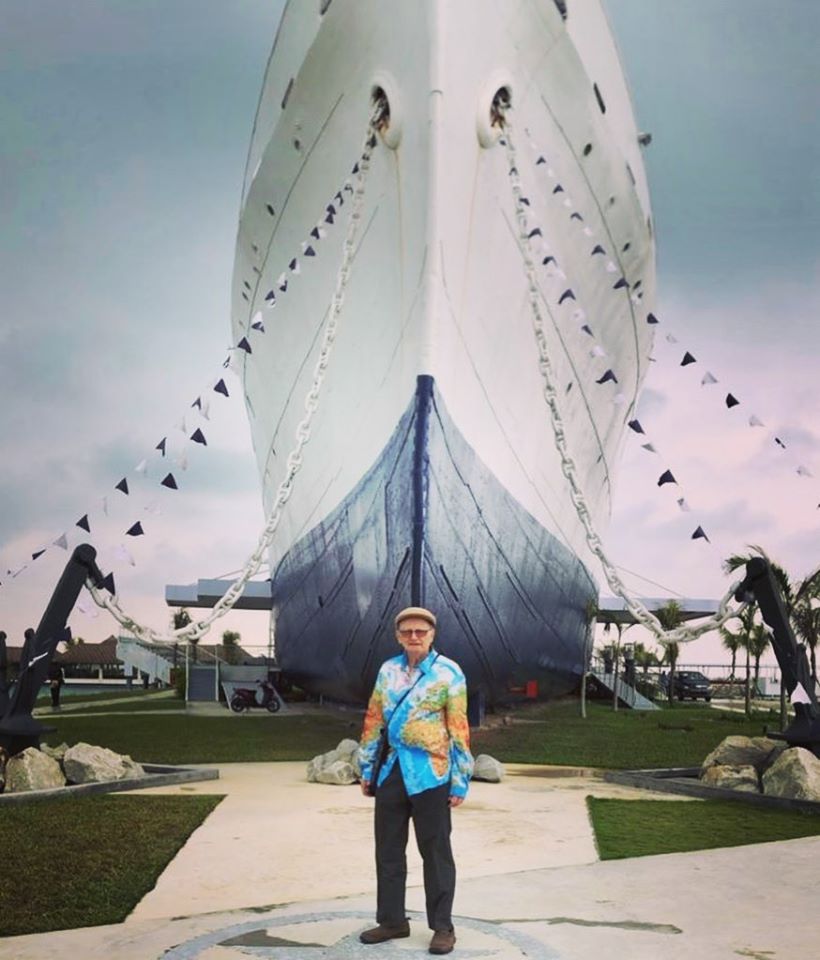
The idea of using a ship for missions came from George’s desire to redeem every minute spent on the road and solve OM missionaries’ perpetual housing woes. Here he is, standing in front of the MV Doulos, which has now been converted into a hotel. Photo from OM Singapore’s Facebook page.
“The real founder of OM’s work in all these different countries like Singapore, all over the world, isn’t me,” he said. “I did not plan to go into these countries. The founder of these is the ship ministry. I just honour everybody who’s ever worked on the ship.”
On the straight and narrow
During his conversations with missionary hopefuls, Verwer found that many of them were not being discipled.
“Besides reading and meditating on the Word of God daily and praying daily, God brought into my life people who helped mentor me, especially Dale Rhoton. And I could share my struggles,” he said.
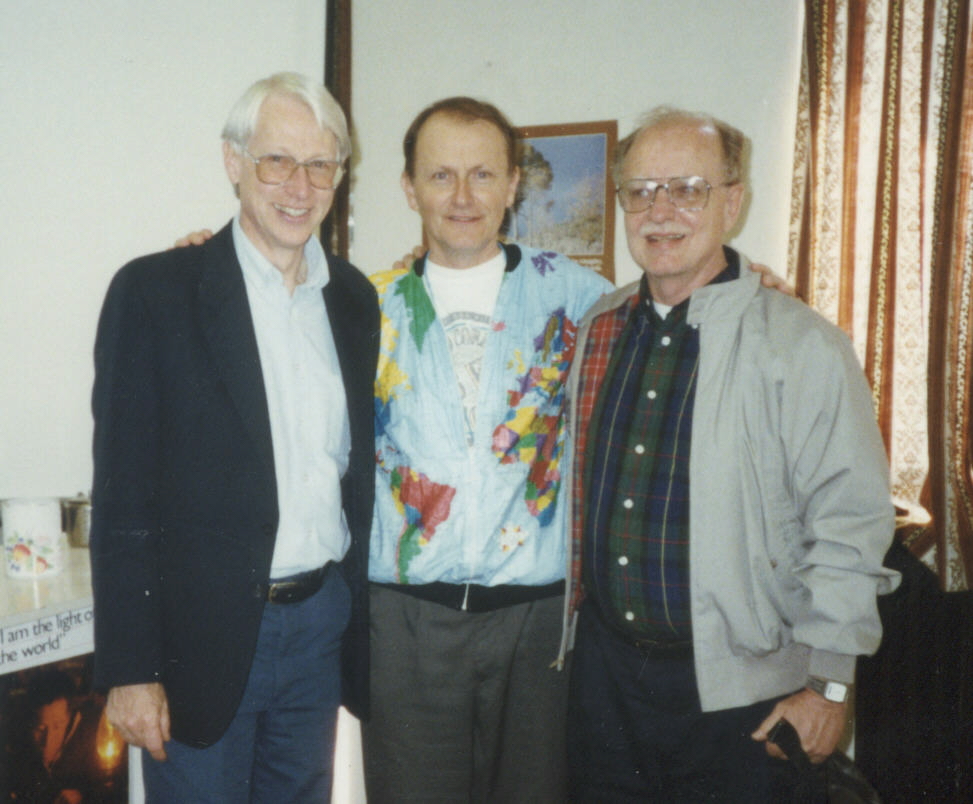
(left to right) Dale Rhoton, George and Walter never imagined what God called them to do during a prayer meeting in 1957 would start a missionary movement that has more than 5,000 missionaries in over 110 countries. Photo from georgeverwer.com.
This is of paramount importance as it has helped him to keep on the straight and narrow, especially when he struggled with lust.
“God’s kept me from doing anything stupid, which is just a miracle, but partly because I don’t keep it all in. When I have a failure in that area – lust of the eyes – I used to talk to Dale,” he admitted openly.
“Brokenness is simply humility’s response to the touch of God.”
“In the end, with all my struggles, I go back to the Word of God which just paves the way for a life of consistency and repenting. We were very fortunate that our movement was born in revival and people were broken.
“Brokenness is not a word used in many places but it is a core word in OM. Brokenness is simply humility’s response to the touch of God.
“So, when God convicts you, instead of defending yourself, you just humble yourself. Now it’s easier when God’s doing it than when a brother is doing it,” he said with a chortle.
This culture of brokenness, confession and repentance has been ingrained in many of those who have passed through OM’s doors, where the emphasis has always been on walking in the light with one another (1 John 1:5-7).
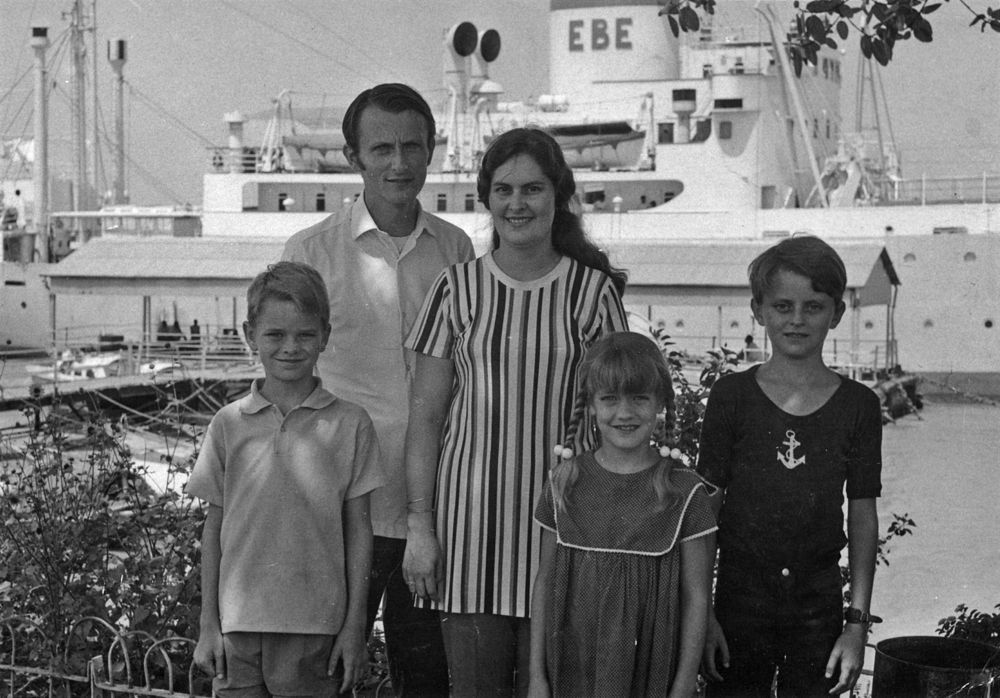
George and Drena with their children in front of MV Logos in Calcutta, May 1972. Photo from OM.org.
“It was easier for me to minister to men and get them to walk in the light about their sexual failures and things. And I think that helped our movement,” said Verwer, who was not born into a Christian family.
“We’ve had very few leaders in the history of OM that had major scandalous falls – almost none in 60 years. It doesn’t mean they don’t sin but it means we learn how to deal with that quickly, in the early stage.”
Messy love
Verwer, however, was also quick to point out that he doesn’t judge those who have fallen, adding that OM was the first group to recruit those who were divorced.
“We are mega into forgiveness and radical grace, certainly more than the average,” he explained. “But we also have our own standards so we can have prevention and we can have cure, where many people think it’s contradictory.”
“We are mega into forgiveness and radical grace.”
The reason he has put these standards in place is because of 1 Corinthians 13.
“The bottom line is loving people, having a legitimate interest in people,” said Verwer. “Relationships are important.”
He noted that, too often, the Church and Christians have placed too much emphasis on dogma over people and relationships.
And this is why he is advocating the need for a different theology: “We need what I call ‘messiology theology’ – a bigger view of how God works and less regimented, less dogmatic.”
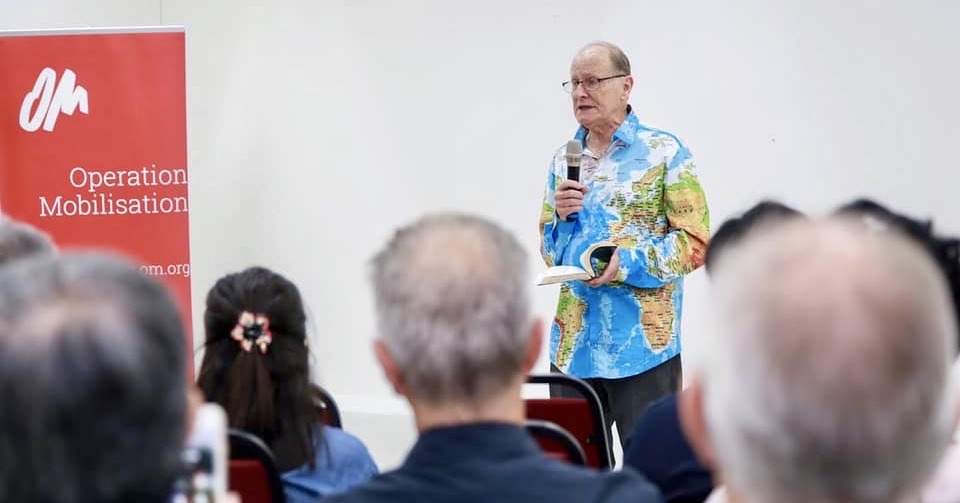
George remains passionate about loving people and having a legitimate interest in them. He is pictured here, sharing his heart for the lost at an OM gathering in Singapore. Photo from OM Singapore’s Facebook page.
Messiology – a play on the word “missiology” and also the title of his latest book – is a term Verwer created to represent the mess of being a Christian that exists in the Church or missions ecosystem.
“We’re taught in Bible school to be dogmatic: Stand your line, defend the faith! Yet we’re also taught from 1 Corinthians 13 that without love, we’re nothing. That’s one of the things I preach about the most.”
We are an independent, non-profit organisation that relies on the generosity of our readers, such as yourself, to continue serving the kingdom. Every dollar donated goes directly back into our editorial coverage.
Would you consider partnering with us in our kingdom work by supporting us financially, either as a one-off donation, or a recurring pledge?
Support Salt&Light